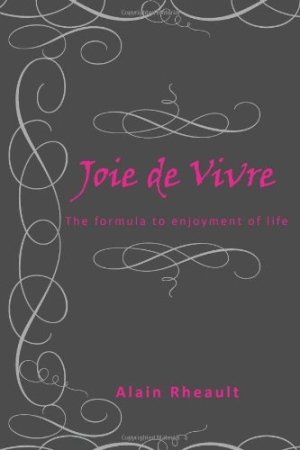Joie de Vivre
The Formula to Enjoyment of Life
Not many memoirs can give you an earworm. It may be impossible, however, to read Alain Rheault’s Joie de Vivre: The Formula to Enjoyment of Life without hearing Bobby McFerrin performing “Don’t Worry, Be Happy” in your head. Rheault’s irrepressibly upbeat outlook on life fills every page of his advice-filled memoir.
In keeping with the trend toward what New York Times columnist Rebecca Tuhus-Dubrow recently called the “self-help memoir” subgenre, Rheault offers instructive anecdotes from a life well lived. Readers have embraced this alternative to the confessional memoir, with titles like Gretchen Rubin’s The Happiness Project and Elizabeth Gilbert’s Eat, Pray, Love topping the charts. Here, readers will find similar advice from a new point of view.
Rheault looks at the world from the position of an elder. He’s a retired Canadian military man and oil field worker who seems to have never had a truly bad day in his life . He’s lived through rough times, but his positive philosophy has always kept him afloat. It is that philosophy Rheault wishes to share in his writing, and he does so through a series of general observations like “Your thoughts create your life,” and specific instructions such as “Try new food,” or “Breathe in life with every breath.”
Short on anecdotes and long on aphorisms, Joie de Vivre repeats its message that happiness breeds happiness with a circular logic that doesn’t always support Rheault’s proposition that anyone can adopt this attitude that has shaped his own joyous existence. One suspects anyone with a personality this buoyant was simply born with a sunny disposition. On the other hand, the joy seems authentic, so there may indeed be some valuable lessons to be gleaned from the author’s experience.
Rheault’s version of positive thinking stands out from the crowd for its outward focus. He insists that the key to joy is found in helping others, being kind, and making someone else smile. Much less self-centered than much of the popular “law of attraction” literature, the author advises using a positive outlook to make the whole world a better place, not just one’s own corner of it.
Readers may tire of Rheault’s more obvious admonitions. He makes the suggestion to “smell the flowers” no less than three times in this slim volume and repeats his moral, “You can enjoy life and be happy,” several times. The compelling thing is that he genuinely means it all, right down to the “recipe for happiness” he hands down from his mother: To make a nice cup of joie de vivre, mix together two cups of love, one teaspoon of happiness, one teaspoon of well-being, and enjoy.
Like folk art in its naïveté, Rheault’s writing looks simplistic on the surface but may upon further inspection reveal a greater truth, that we have the power to make life more enjoyable, both for ourselves and for others. At its heart, Joie de Vivre is an uplifting read, and it’s nice to know there is someone out there who genuinely wants to teach people to stop worrying and just be happy.
Reviewed by
Sheila M. Trask
Disclosure: This article is not an endorsement, but a review. The publisher of this book provided free copies of the book and paid a small fee to have their book reviewed by a professional reviewer. Foreword Reviews and Clarion Reviews make no guarantee that the publisher will receive a positive review. Foreword Magazine, Inc. is disclosing this in accordance with the Federal Trade Commission’s 16 CFR, Part 255.

